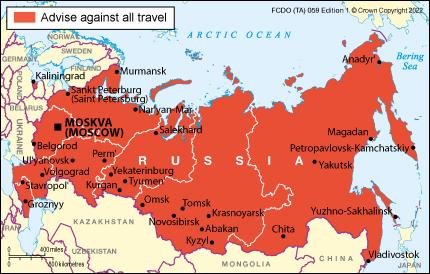Russia’s intentions to deploy up to 10,000 troops in the breakaway region of Moldova have sparked renewed concerns over regional security, the Moldovan Prime Minister warned on Wednesday. The planned military buildup in Transnistria, a separatist territory long supported by Moscow, underscores rising geopolitical tensions in Eastern Europe. This development comes amid ongoing disputes over Moldova’s sovereignty and fears of escalating conflict reminiscent of wider Russo-Ukrainian dynamics.
Russia Signals Major Military Buildup in Moldovan Breakaway Region Raising Regional Security Concerns
Russia’s intent to station a significant military force of 10,000 troops in the contested Moldovan region has triggered alarm across Eastern Europe. The move underscores Moscow’s determination to bolster its influence in Transnistria, a breakaway territory that has remained a frozen conflict zone since the early 1990s. Regional leaders and international observers warn that this buildup could destabilize the fragile security balance, escalating tensions not only within Moldova but also among neighboring NATO members.
The implications of such a deployment are multifaceted:
- Increased Military Presence: The addition of thousands of troops could intensify militarization and complicate peaceful resolution efforts.
- Heightened Diplomatic Strain: Moldova’s government has expressed strong opposition, calling on Western allies to respond decisively.
- Potential for Broader Regional Conflict: Neighboring countries fear spillover effects, particularly in light of ongoing Russia-Ukraine hostilities.
| Factor | Potential Impact |
|---|---|
| Troop Numbers | 10,000 Russian soldiers |
| Location | Transnistria region |
| Regional Response | Increased NATO vigilance |
| Moldova’s Position | Strong diplomatic protest |
| Security Concerns | Escalation risk for Eastern Europe |
Expert Analysis Explores Geopolitical Implications of Troop Deployment on Eastern European Stability
The proposed deployment of 10,000 Russian troops in the separatist region of Transnistria has generated alarm among Eastern European governments and NATO officials, raising concerns over the delicate balance of power in the region. Experts emphasize that this move could effectively bolster Moscow’s influence in Moldova, potentially destabilizing the fragile ceasefire between Chisinau and the breakaway territory. Geostrategic analysts warn that such a military buildup risks provoking security dilemmas, escalating tensions not only in Moldova but also in neighboring states bordering both NATO and the EU.
Key geopolitical implications include:
- Increased Russian leverage: Strengthening of military presence providing Moscow with a foothold to project power westward.
- Regional instability: Heightened security concerns in Eastern Europe could trigger a chain reaction affecting Ukraine and the Baltic states.
- Diplomatic friction: Potential to disrupt ongoing negotiations within the 5+2 format addressing Moldova’s frozen conflict.
| Impact Area | Potential Outcome |
|---|---|
| Military Balance | Shift towards Russian advantage |
| Diplomatic Relations | Strained East-West ties |
| Security Environment | Heightened regional alertness |
| Economic Stability | Risk of sanctions and trade disruptions |
Policy Recommendations Emphasize Diplomatic Engagement and Enhanced Support for Moldovan Sovereignty
In response to the alarming prospect of Russia expanding its military presence in the Moldovan breakaway region, experts and policymakers are calling for a multilayered approach centered on robust diplomatic efforts. It is widely asserted that strengthening dialogue channels between Moldova, Russia, and regional stakeholders like the EU and the OSCE is critical to defusing tensions. Such diplomatic engagement should prioritize transparent communication frameworks and confidence-building measures aimed at preventing escalation and preserving regional stability.
Simultaneously, enhanced international support for Moldova’s sovereignty is deemed essential to counterbalance external pressure. Key recommendations include:
- Increased financial aid targeting defense and border security enhancement
- Expanded technical and intelligence cooperation with NATO and EU partners
- Firm diplomatic backing in international forums to uphold Moldova’s territorial integrity
- Strategic communication campaigns to reinforce Moldovan unity at home and abroad
| Policy Focus | Recommended Action | |||||||
|---|---|---|---|---|---|---|---|---|
| Diplomatic Engagement | Facilitate trilateral talks between Moldova, Russia, and EU | |||||||
| Sovereignty Support | Increase EU financial and military aid | |||||||
| Information Security | Launch counter-disinformation campaigns | |||||||
In response to the alarming prospect of Russia expanding its military presence in the Moldovan breakaway region, experts and policymakers are calling for a multilayered approach centered on robust diplomatic efforts. It is widely asserted that strengthening dialogue channels between Moldova, Russia, and regional stakeholders like the EU and the OSCE is critical to defusing tensions. Such diplomatic engagement should prioritize transparent communication frameworks and confidence-building measures aimed at preventing escalation and preserving regional stability. Simultaneously, enhanced international support for Moldova’s sovereignty is deemed essential to counterbalance external pressure. Key recommendations include:
|
















